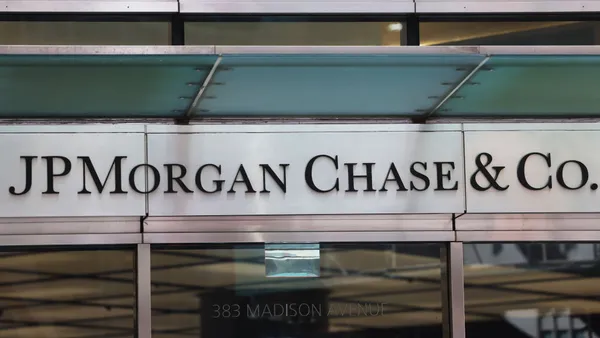Dive Brief:
- Betterment unveiled its new checking and savings account platform last week, a move that's already caught the attention of regulators who have asked for clarity regarding the new service, several sources told CNBC.
- The wealth adviser said its new savings account is insured by the Federal Deposit Insurance Corp. (FDIC) for up to $1 million with an interest rate of 2.69%. Its checking account is FDIC-insured for up to $250,000. The new platform is expected to launch in September.
- Betterment was asked to provide one of its regulators with more specifics shortly after its announcement on Tuesday, one source said. Betterment had been in contact with the Financial Industry Regulatory Authority (FINRA) and the Securities and Exchange Commission (SEC) in the month ahead of the announcement, the source said.
Dive Insight:
Fintechs and digital banks continue to offer some of the industry's highest interest rates for savings accounts.
In a press release, Betterment CEO Jon Stein called his company's new checking and savings platform a solution to a long-standing industry problem.
"The biggest challenge for Americans, when it comes to their money, is saving for the future, and unfortunately a majority of the traditional banks they depend on charge extra fees, encourage cash-holding and upsell unnecessary products," he said.
Betterment's 2.69% annual interest rate for its new high-yield cash savings account is the highest on the market, according to a survey by Magnify Money.
However, that rate is promotional and only applies to cash deposited through 2019, Money reported. After the promotion, the return drops to 2.43%.
Additionally, Betterment isn't the first robo-adviser to enter the space. Wealthfront, another fintech company, launched a cash account in March with an interest rate of 2.57%. Like Betterment, Wealthfront's savings account is FDIC-insured on balances of up to $1 million.
Though companies like Betterment and Wealthfront are not banks, they partner with banks. Betterment's deposits are held by banks such as Citigroup, Barclays, Valley National Bank and Georgia Banking Company, where the funds earn interest and are federally insured.
"Because our structure is different than a typical bank account, we can offer better terms than banks can," Stein told Money. "Betterment finds banks that are willing to offer the best rates and then passes those rates on to the customer. And we are constantly searching for the best rates and new partner banks."
Stock-trading app Robinhood made headlines last year over its failed launch of a checking account, which it said would have yielded a 3% interest rate.
The company had not contacted the SEC or Securities Investor Protection Corp. ahead of the launch, Stephen Harbeck, who was then the head of the SIPC, told CNBC. Harbeck retired on April 1.
Senators wrote a letter last year to agency regulators asking how they planned to "monitor fintechs who, intentionally or not, blur financial products for competitive advantage."












